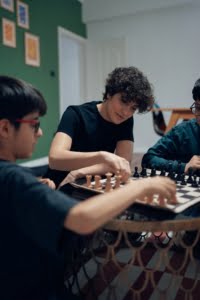 Meet Kayla, an ambitious type-A gal who always gets the job done. She never forgets a birthday text or email and checks off the to-do list with pride. There is a strong chance that she is the oldest child in the birth order.
Meet Kayla, an ambitious type-A gal who always gets the job done. She never forgets a birthday text or email and checks off the to-do list with pride. There is a strong chance that she is the oldest child in the birth order.
Meet Annie, her life moves along a good pace, she never seems to be in a hurry, and would rather go with the flow. She is likely the youngest child.
Meet Robert. Never feels like he is meeting expectations, and tends to make a lot of noise to get attention. He is probably a middle child.
In the discussion of how nature versus nurture impacts a person, birth order plays an interesting role. However, the order in which you are born, a topic often discussed with a Christian Counselor, will have an impact on your personality.
Some common birth order traits.
Only child.
This child is likely to be highly independent. Not having siblings means they have learned to entertain themselves and do things by themselves. They have the full of their parents’ attention, which may feel like a lot of pressure depending on the situation. More stereotypical traits include:
- Entitled
- Spoiled
- High achievers
- Highly sensitive to criticism
- Lonely
Firstborn.
Depending on the gap between them and their younger sibling they may have some similar traits to only children. They often carry a lot of pressure (real or imagined) to live up to parental expectations. Depending on their parents’ choices they may also act as surrogate parents to their younger siblings. It is common for firstborns to have some of these traits:
- Cautious
- Bossy
- Rule followers
- Responsible
- Achievement oriented
Middle child.
 This child is frequently a boundary pusher. The parents learned a lot with their first kid, but a new personality gets thrown into the mix and now they need to reevaluate their decisions. The stereotypes of second-borns range from relaxed to rebellious, often to distinguish themselves from the older sibling. A few common stereotypes are:
This child is frequently a boundary pusher. The parents learned a lot with their first kid, but a new personality gets thrown into the mix and now they need to reevaluate their decisions. The stereotypes of second-borns range from relaxed to rebellious, often to distinguish themselves from the older sibling. A few common stereotypes are:
- Creative
- Fun-loving
- Defiant
- Sociable
- Resilient
Youngest.
The youngest child has the advantage of experienced parents, or maybe the disadvantage of highly exhausted parents. If parents have three or more children, they have started to reevaluate how much attention they can give. It often gets diverted to the neediest, which for a while is the baby. Some common stereotypes include:
- Risk-taking
- Independent
- Manipulative
- Spoiled
- Outgoing
Other factors affecting the dynamic of birth order.
Age gaps can also impact the dynamic of birth order. Larger age gaps may result in lots of attention on each child through each stage of life, while tight age gaps can create a blurred experience between children.
Siblings, fairly or not, will often be lumped together by gender and proximity of age. Some personalities will be more naturally drawn together, while others clash, regardless of age, birth order, and gender. Certain traits can be observed in birth order, but it is not a given that every firstborn will be responsible, and every youngest child will be a brat.
It takes intentionality on the part of parents to recognize their children as individuals. Parents who are trying to learn will be able to apologize for their failures without giving the false impression that they are abject failures. Being born in a certain order is not a box that requires everyone to fit. These traits are common, but not always true.
Birth order traits in adulthood.
 In adulthood, oldest children will often carry a lot of the burden of caring for aging parents. The oldest children must communicate with younger siblings without shaming them. Be aware of resentment creeping into relationships.
In adulthood, oldest children will often carry a lot of the burden of caring for aging parents. The oldest children must communicate with younger siblings without shaming them. Be aware of resentment creeping into relationships.
No one gets to choose the order in which they are born, and we are not completely in control of what impacts us. But everyone can learn the strengths and weaknesses that they developed because of their birth order.
The most important part of birth order is not making assumptions. Just because it is common doesn’t make it right or true. Just because it is observable for many doesn’t make a box that someone has to fit into.
Human beings are complicated, personalities are formed from a mix of birth order, religion, school, socio-economic bracket, etc. There are so many things that impact each person and their development.
Benefits of family counseling.
Family counseling at San Diego Christian Counseling may be an excellent way to talk through the dynamics of your family. Your family counselor in San Diego will provide a bridge between the different experiences and perspectives of each family member. The counselors at San Diego Christian Counseling will sit down with the family, creating a safe space for everyone to feel seen and heard. Learning to see another perspective can bring all of you closer to one another.
“Silly Faces”, Courtesy of Austin Pacheco, Unsplash.com, CC0 License; “Chess Players”, Courtesy of Tahir Osman, Unsplash.com, Unsplash+ License; “Siblings”, Courtesy of Eye for Ebony, Unsplash.com, CC0 License


